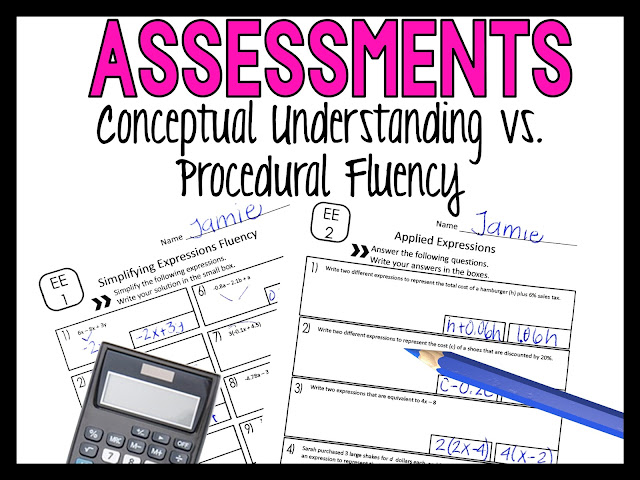Creating the best middle school math assessment can be difficult. Should you focus on conceptual understanding, procedural fluency or both?
Conceptual Understanding
Before the 1960's arithmetic was the majority of what was taught in math class. Then the United States entered the space war with Russia...the USA was determined to become the best. As a result, the "new math" was introduced. The "new math" dove into matrices, trigonometry, geometry, and more all on a very conceptual level. The "new math" eventually received a lot of push back as many people thought it would be more beneficial for students to learn a little about a lot of math.
Procedural Fluency
The curriculum then changed to "a mile wide but an inch deep." At this point, math became less conceptual and more algorithm based. The students that naturally had good math reasoning were still pushed along and entered Calculus during high school, but every one else started to get left behind. This became evident when they entered college. The basic level math classes at the the Universities were full and many students were struggling.
Combining the Best of Both
It was clear that the standards were failing many students. Purely conceptual wasn't a solution, and purely procedural didn't work either. The new standards were created with the goal of valuing conceptual and procedural. With these new standards, the hope of many educators is to not let students get left behind. To allow all students to succeed, first teach at a conceptual level so students can reason through the mathematics and perhaps even discover an algorithm. Encourage procedural fluency, but only after they have mastered conceptual understanding.
It was clear that the standards were failing many students. Purely conceptual wasn't a solution, and purely procedural didn't work either. The new standards were created with the goal of valuing conceptual and procedural. With these new standards, the hope of many educators is to not let students get left behind. To allow all students to succeed, first teach at a conceptual level so students can reason through the mathematics and perhaps even discover an algorithm. Encourage procedural fluency, but only after they have mastered conceptual understanding.
Make Sense of Math has created math assessments for 7th grade math and 8th grade math students that test both conceptual understanding and procedural fluency. These work great as formative or summative math assessments, and are editable for use year after year. Students will calculate, write, model, analyze and explain to show their understanding.
CHECK OUT WHAT OTHER MATH TEACHERS ARE SAYING ABOUT THESE ASSESSMENTS
- "Valuable resource; saved me so much time!" - 7th Grade Math Assessments
- "Easy to use and provides awesome data on student understanding" - 7th Grade Math Assessments
- "Such a time saver." - 8th Grade Math Assessments
- "This is exactly what I was looking for to give to my students before and after each unit. I am really looking forward to trying this out this year with my students. I think it will really help them become more aware of where they are and what skills they need to continue working on. " - 8th Grade Math Assessments
- "I love that it covers so many different topics. There are so many ways these can be used." - 8th Grade Math Assessments













